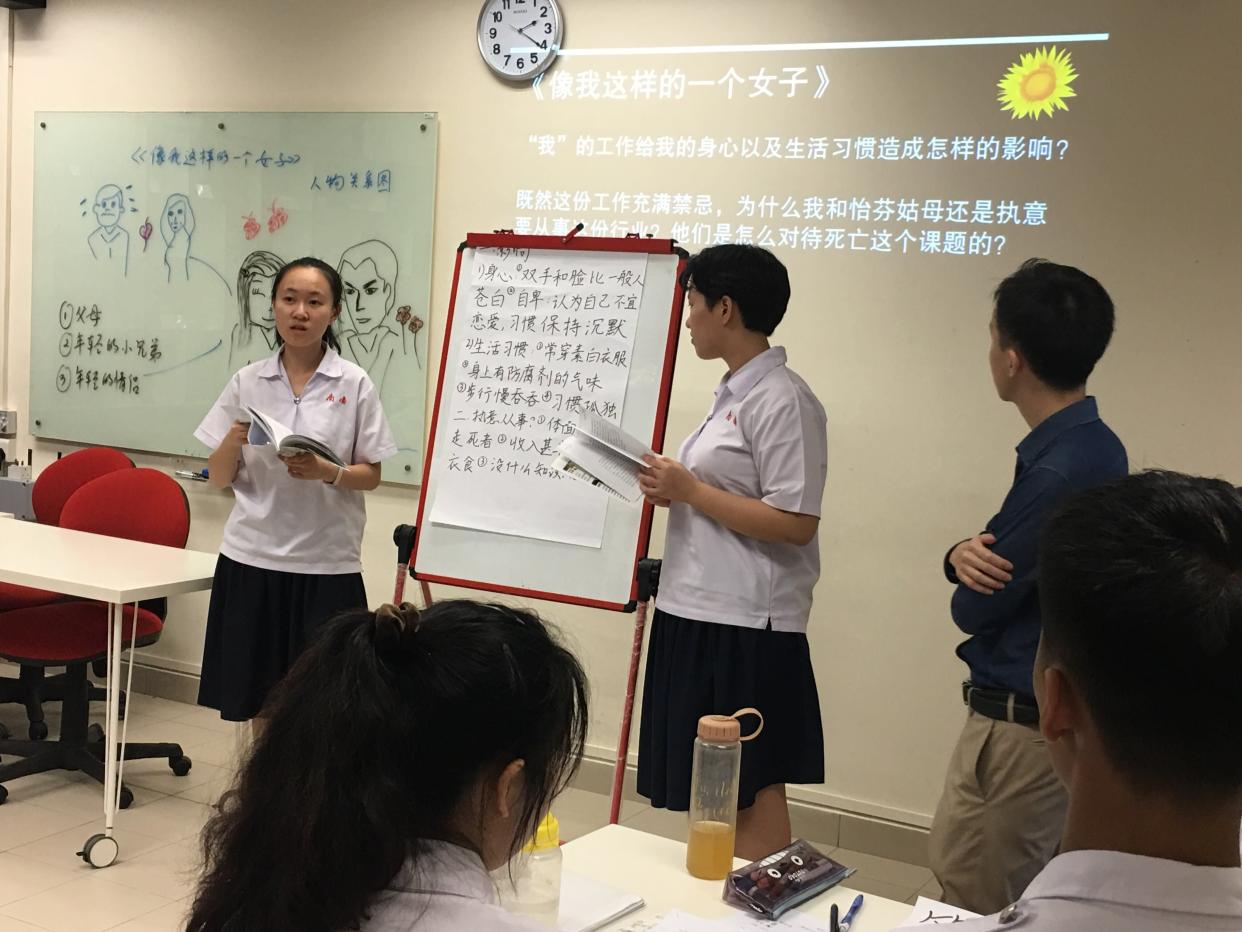Inspiring lifelong passion in learning mother tongue is key emphasis among new LEP schools

SINGAPORE — Chinese Literature classes at Nan Chiau High School are often filled with interesting activities. Students get to role-play scenes from acclaimed literature, and engage in group discussions to analyse the qualities of literary works.
Such activities form the basis of the school’s objective of inspiring students into a lifelong passion in learning the subject, and will be expanded to include more enrichment events when the secondary school introduces the Chinese Language Elective Programme (CLEP) next year.
Nan Chiau is one of nine schools to implement this programme at secondary-level for the first time, announced by Education Minister Ong Ye Kung at the annual Teachers’ Conference on Tuesday (28 May).
The others are: Anglican High School, Chung Cheng High School (Main), Dunman High School, Hwa Chong Institution, Maris Stella High School, Nan Hua High School, Nanyang Girls’ High School, and Temasek Junior College.
Enrichment activities outside classwork
Tang Jui Piow, Nan Chiau’s acting head of department for mother tongue languages, told Yahoo News Singapore on Monday that the school will be organising many enrichment events outside of classwork to engage CLEP students in learning their mother tongue language.
He said, “We will have combined literature camps with students from other schools offering CLEP, seminars and workshops with local and foreign authors, as well as talks with members of our school alumni who have gone on to produce literary works. There may also be opportunities for overseas immersion trips.
“We believe that the most important way of inspiring students is to expose them often to the languages via literary events and activities. This breeds familiarity with their mother tongue languages, and hopefully they will find the right attitude to continue pursuing their learning of the languages even after school life.”
Indeed, for the secondary schools and junior colleges (JCs) which will offer LEP programmes for the first time next year, lifelong learning of the languages is what they aim to instil among their students through their enriched curriculum.
Schools offering MLEP and TLEP
Besides the nine schools offering CLEP at secondary level, three schools will be introducing the Malay LEP (MLEP) – Anderson Secondary School, Bukit Panjang Government High School, and Tanjong Katong Secondary School. Another three schools – Commonwealth Secondary School, Riverside Secondary School, and Yishun Town Secondary School – will roll out the Tamil LEP (TLEP).
The TLEP will also be introduced for the first time in two JCs (National Junior College and Anderson Serangoon JC). Meanwhile, National JC and Raffles Institution (JC) will join Jurong Pioneer JC, Tampines Meridian JC, and Yishun Innova JC in offering MLEP at JC level.
Kamalavani Palaiyan, Tamil teacher at Anderson Serangoon JC, believes that language forms a key component in a student’s identity, and the new TLEP-JC programme will help in motivating more Tamil students to take up the subject at JC level.
She said, “We aim to expand their boundary of learning beyond the current Tamil Literature curriculum. They will get to hear from professionals from different art forms, such as poets, writers and theatre artists, on how they create their literary works.
“Through experiential learning from our programme, we hope the students can get a first-hand learning of the values and qualities from the rich history of the Tamil culture, which will help to shape their identity as they enter adulthood.”
Sharing culture with other races
At Bukit Panjang Government High School, students taking the MLEP will be learning how the Malay culture can thrive in the modern society.
Rasiah Buang, the school’s Malay language teacher/coordinator, hopes that, through short stories, poems or even songs, students can learn about how literature and art can influence the Malay community positively, and be inspired to become literary writers too.
Another of the key emphasis for Bukit Panjang’s MLEP students will be about sharing the Malay culture and its values among the school population, said Tan Kok Hua, the school’s head of department for mother tongue languages.
He added, “After broadening their learning horizons through the programme, we want the students to become cultural ‘transmitters’, and promote their cultural values to the other races.
“It is about inculcating future leaders in the language.”
Related story:
Language Elective Programme to be introduced in secondary schools from 2020: Ong Ye Kung



